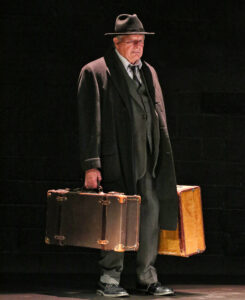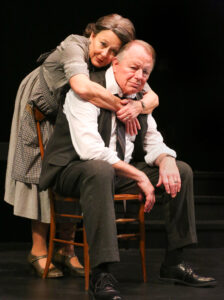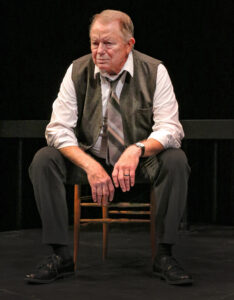
Rob Donohoe in Death of a Salesman at Palm Beach Dramaworks. Photo by Tim Stepien
By Oline H. Cogdill
Death of a Salesman with its themes of capitalism, a crushed American Dream, and misplaced priorities is inarguably the quintessential American play. This perfect play currently is receiving a near-impeccable production at Palm Beach Dramaworks through April 14.
During the course of a few days, salesman Willy Loman—a great metaphor for a downtrodden character—will look back on his life, his crumbling career, disenfranchised family, and myriad regrets as he basically talks himself to death. That’s not a spoiler—Arthur Miller’s Pulitzer Prize-winning play is called Death of a salesman.

Ty Fanning, left, Rob Donohoe , center, and Michael Shenefelt in Death of a Salesman at Palm Beach Dramaworks. Photo by Tim Stepien
Seamlessly directed by J. Barry Lewis with a top-notch cast, Dramaworks’ production delves deep into all the themes this classic play explores while also excavating even more substance. A fear of lives wasted, of wrong choices permeates the production as does the sense that every character is in denial about those choices and each character’s sense of identity.
Death of a Salesman’s plot is simple, yet also complicated. An exhausted Willy Loman arrives home after being on the road, dropping his sample cases as well as his life’s burdens as he enters the house he shares with his wife, Linda. Their two grown sons—Biff, a once promising athlete who peaked in high school, and Happy, who has slid through life—are visiting.

Rob Donohoe and Helena Ruoti in Death of a Salesman at Palm Beach Dramaworks. Photo by Tim Stepien
But the reunion is not happy. Willy’s weariness of being on the road has affected his work. His sales are down, making paying his simple bills almost insurmountable. His disappointment in himself extends to his sons, who never measured up to what Willy wanted, and there are serious unresolved issues between father and sons. Willy ingrained in Biff and Happy the need to be “well liked,” but never put an emphasis on doing the work.
Willy also takes out his frustrations on his doting wife, Linda, who worries that her husband is trying to harm himself. During the next two-plus hours, the plot veers from the past to the present and back again, as Willy remembers his life, including the relationship with his adventurous and wealthy brother Ben, and as his contemplates his future.
Willy Loman is one of the meatiest men’s roles in American theater and veteran actor Rob Donohoe brings everything to this character. Donohoe enters the stage world weary, beaten down by his job, the decisions he made and life on the road, all of which he exudes as Willy. He has given his all to this work but, like so many others, the job doesn’t love him back. Donohoe is constantly fidgeting as if being in constant movement will somehow bring him peace. As Willy’s mental state deteriorates, Donohoe seems to emotionally and physically age. Donohoe makes his 12th appearance in a Dramaworks production, and his presence is always welcome.

Michael Shenefelt and Helena Ruoti in Death of a Salesman at Palm Beach Dramaworks. Photo by Tim Stepien
Michael Shenefelt exhibits a complete realistic character arc as Biff, finally able to come to terms with the resentment he harbors for his father and his own failings. One time, Biff was bound for college and a promising athletic career until something happened. Shenefelt’s Biff is annoyed at being back home after being in Texas for awhile without communicating with his family. He cares about his mother but has unresolved anger toward his father. His realization that he could end up like Willy unless he changes and admits his faults is palpable as Shenefelt invests in Biff’s growth. Death of a Salesman is Shenefelt’s Dramaworks debut and we hope he returns.

Rob Donohoe, center, with Michael Shenefelt and Ty Fanning, standing, in Death of a Salesman at Palm Beach Dramaworks. Photo by Tim Stepien
Ty Fanning, also making his Dramaworks debut, delves into his character of Happy, showing a man who reverts back to being a teenager when at his parents’ house, despite being on his own for some years. His arrogance and determination to make himself seem as if he has a bigger career than he does shows he has more in common with his father than he wants to.
Tom Wahl is a chameleon as an actor, able to immerse himself into every role, making each of the many characters he has played through the years distinct. As Willy’s brother Ben, Wahl knows he is a success without bluster. Wahl’s perpetual smile hints that Ben knows many secrets.

Rob Donohoe in Death of a Salesman at Palm Beach Dramaworks. Photo by Tim Stepien
Lewis has assembled a solid supporting cast. Matthew W. Korinko elevates every character he plays whether it is a prominent role or a minor, scene-stealing one such as Howard Wagner, Willy’s exasperated boss. William Hayes, Dramaworks’ producing artistic director and co-founder of the theater company, again makes a most inviting return to the stage as Charley, Willy’s neighbor. Audiences last saw Hayes on the Dramaworks stage in 2022’s outstanding Twelve Angry Men. He will be most welcomed again on the stage aside from giving the opening curtain speech.
The solid supporting cast includes Helena Ruoti as Willy’s underappreciated wife, Linda; Harrison Bryan as Bernard; along with Nathalie Andrade, Hannah Hayley, John Campagnuolo, and Gracie Winchester (last seen as 1969 in Dramaworks’ The Messenger.)
Anne Mundell’s effective scenic design works with three open platforms, using only a few bare tables and scattered chairs, forcing the audience to feel how off kilter Willy’s life has become as well as put full focus concentrating on the actors and the words.
Kudos also go to costume design by Brian O’Keefe; lighting by Kirk Bookman; sound by Roger Arnold and scenic artist Kristen Myrick Hill. Original music composed by Joshua Lubben is a wonderful surprise. Also setting the production’s tone is the original art of the salesman’s silhouette by Paul Gaschler, who also does all Dramaworks’ poster art; Adam Thompson then created the breakaway video/animation of Paul’s original image.
Death of a Salesman premiered on Broadway 75 years ago; and still remains timely and enthralling as Palm Beach Dramaworks proves.
Death of a Salesman runs through April 20 at Palm Beach Dramaworks, 201 Clematis St., West Palm Beach. Evening performances are Wednesday through Saturday evening at 7:30 p.m. Matinee performances are Wednesday, Thursday, Saturday, and Sunday at 2 p.m. Running time approximately two hours, with a 15-minute intermission. Post-performance discussions follow Wednesday and Thursday matinees. Tickets for all performances are $89. Student tickets are available for $15 with a valid K-12 or university/college ID, and anyone under 40 pays $40 (no additional fees) with a photo ID. Tickets for educators are half price with proper ID (other restrictions apply). Group rates for 10 or more and subscription packages for four or five plays are also available. Tickets can be purchased through the box office, or 561-514-4042; palmbeachdramaworks.org









 A PaperStreet Web Design
A PaperStreet Web Design
